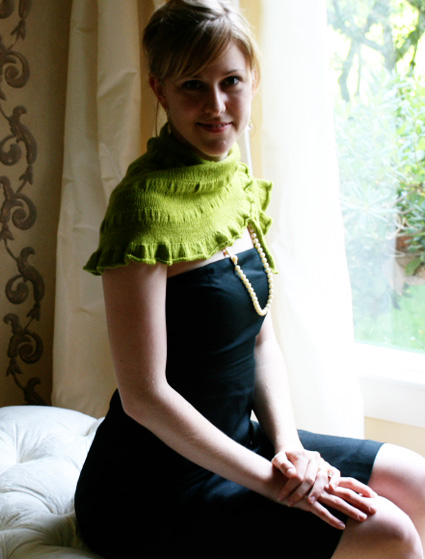

|
|
|
 |
As this little shawlette was taking shape, I couldn’t
help but notice a resemblance to a slice
of citrus due to its semi-circular shape and increases subtly
radiating from the center. With its bit of ruffle and ruching,
and especially its reference to my favorite of the California
winter crops, I knew I would be wearing this wintry fruit accessory
to each and every holiday party this year. Draped around the shoulders or scrunched around the neck, this piece will add just a bit of dressiness to any holiday outfit. |
|
|
|
|
SIZE |
|
FINISHED MEASUREMENTS |
|
MATERIALS Notions |
|
GAUGE |
|
PATTERN NOTES |
|
This semi-circular shawlette is worked from the center of the upper edge outwards, so the size can be easily customized; see notes within pattern. Heavier weights of yarn can also be substituted; adjust needle size to suit yarn choice. |
|
DIRECTIONS Row 1 [WS]: K3, place marker, p3, place marker, k3. SHAWL BODY First Section: For each section below, work Rows
1-20 as for the first
section, EXCEPT that the Increase
Rows (Rows 9 and 19)
will be worked differently. St numbers for Rows
1 and 7 are given for each section, as well as directions for each
Increase Row.
Third Section: Fourth Section: Fifth Section: Note: To change size of shawl, more or fewer sections may be worked. If working more sections, be sure to increase 24 sts evenly across each Increase Row. After Row 20 of last section has been worked, proceed to ruffled edging. RUFFLED EDGING
|
|
FINISHING |
| ABOUT THE DESIGNER |
|
Hilary Smith Callis lives in San Francisco
with her husband and step-cat and has worked
at NASA since a few months after she received
her highly relevant degree in Greek and
Latin. |
|
Pattern & images © 2009 Hilary Smith Callis. Contact Hilary |